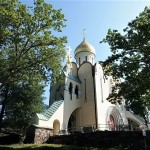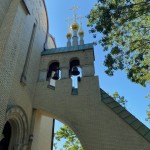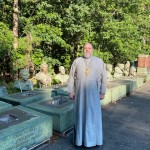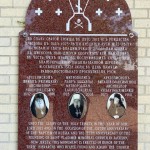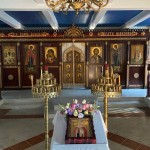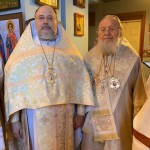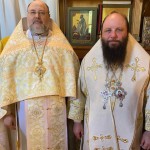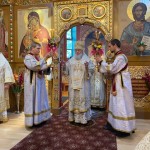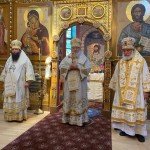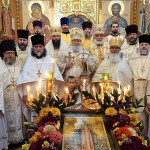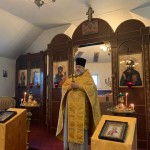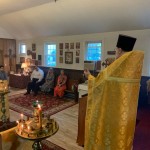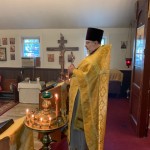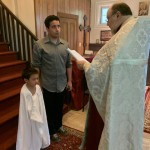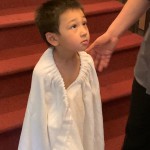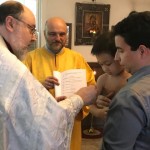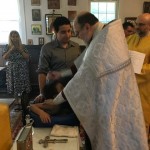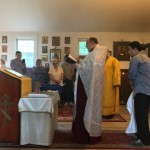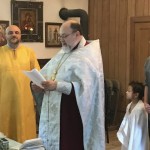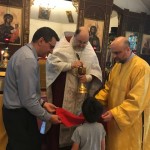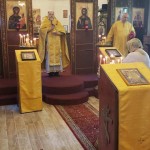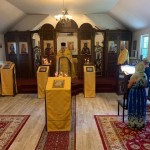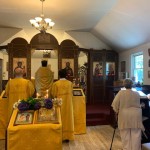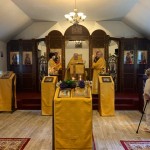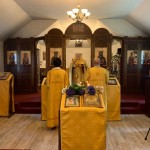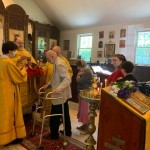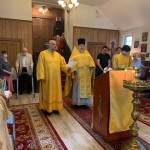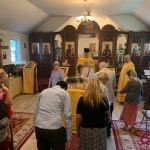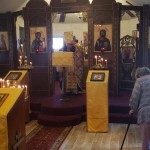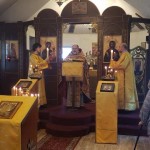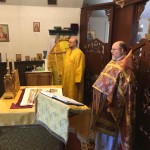On July 26, on the 7th Sunday after Pentecost, as well as on the Sunday of the Holy Fathers of the Six Ecumenical Councils, we had a beautiful celebration at St. George Church. Our Rector, Archpriest Igor Tarasov served the Divine Liturgy in our parish temple. After the Gospel lesson he preached the following homily in Russian:
«Дорогие во Христе братия и сестры! Сегодня в очередной раз евангельское чтение поведало нам об исцелении больных (Мф. 9, 27-35). И в который раз мы также услышали, что учители еврейского народа, фарисеи, отвергли эти исцеления. «Сегодня мы читали, что они считали эти чудеса творимыми силою бесовскою (Мф. 9, 34). Поэтому хотелось бы сегодня поразмышлять об этом противостоянии фарисеев, книжников и саддукеев Христу и увидеть его главную причину. Почему они выступали против Христа? На их глазах Господь исцелял болящих, врачевал различные недуги, даже воскрешал мертвых, но они не уверовали в Него. Они не считали Его тем Мессией, которого ожидали; они отвергли Его и в конце осудили на распятие».
«Почему такое произошло? Здесь, дорогие братия и сестры, проявлялась наша удивительная способность стремиться веровать в такого Бога, которого хотим мы. Это способность падшего человека не искать истинного Бога, а создавать самому себе Бога по своему хотению. И так человечество на протяжении тысячелетий создавало себе различных богов, покланялось разного рода идолам, которые занимали место истинного Бога. Возьмем к примеру древних греков и римлян, тех, кого апостол Павел называет «еллинами». И вот они имели богов на все случаи жизни. Если они желали воевать, то у них был воинственный бог Марс, если они хотели предаваться блуду, то была богиня Афродита, или Венера, а при ней такой мальчик с крылышками – Амурчик, он же Купидон. До сих пор его рисуют как символ чувственной любви, с луком и стрелами. На деле же эти так называемые боги олицетворяли человеческие занятия, а часто – человеческие страсти и похоти».
«В то же время у иудеев была вера в единого истинного Бога. Но и там иногда эта вера искажалась в представлении людей, и многие веровали в такого Бога, которого хотели они. И поэтому, когда в мір пришел Сын Божий, Иисус Христос, далеко не все иудеи уверовали в Него. Возьмем саддукеев. Саддукеи были такие себе рассудочные люди, мало верующие в духовные вещи, не верующие в такое важное понятие как воскресение мертвых. А ведь это было главная надежда верующих людей – что когда-нибудь Бог воскресит всех людей. В это веруем и мы, христиане. Мы говорим: «Чаю воскресения мертвых и жизни будущаго века». А саддукеи это отрицали. И при этом именно они во времена Христа были иудейскими первосвященниками, главными служителями Храма. И вот, появляется некий Галилеянин, Иисус, который учит, что Он – Мессия и что Он воскресит всех в последний день. А еще Он обличал порядки, которые тогда были установлены в Храме, изгонял оттуда торгующих. Конечно же первосвященникам претил такой Проповедник, и они решительно отказывались видеть в Нем Мессию. И вот они были главными организаторами Его осуждения и распятия».
«Теперь о фарисеях. Это были ревностные приверженцы всех традиций иудейской религии, неукоснительные соблюдатели всех обрядов и обычаев. Они наоборот, верили во все, что было в Писании и иудейском предании. Молились, постились. Не общались с язычниками. Но на деле многие из них были лицемерами: внешне соблюдали все правила и исполняли обряды, а на деле занимались разного рода злоупотреблениями, грешили, особенно гордостью и осуждением. И вот приходит Иисус Христос, который призывает соблюдать не букву, а дух закона, который исполняет суть закона, без всяких наслоений и добавлений. Он исцеляет в субботу, когда фарисеи считали, что ничего нельзя делать. А еще Он обличает их, фарисеев, в лицемерии, называет «гробами побеленными», которые внешне красивы, а внутри полны мерзости и нечистоты (Мф. 23, 27). И конечно же и фарисеям такой Мессия не нравился, а на деле не нравился истинный Бог. Вот потому и они осуждали Христа, постоянно Его отвергали, говорили, что Он исцеляет силою князя бесовского. А в конце они были единодушны с саддукеями, что Его следует распять».
«Все эти извращенные понятия о Боге среди людей существуют и поныне. В міре множество религий, верований и учений и все они предлагают свой вариант Бога или божественного. И человеку ищущему истину, но не имеющему благодати Божией и правильного понимания, очень тяжело разобраться во многоообразии этих всех учений. Однако, слава Богу, что мы с вами имеем истинную веру в Бога, веру христианскую и православную. Мы в Православии имеем возможность знать единого истинного Бога и Иисуса Христа, которого Он послал, а тем самым иметь жизнь вечную (Ин. 17, 3). Сегодня мы вспоминаем Отцов шести Вселенских Соборов, тех Соборов, которые определили, что есть Православная вера. Шесть из семи Вселенских Соборов четко указали, каковы границы этой веры, что есть православное учение, а что нет. И вот это помогает нам разобраться, где истина, а где ложь».
«Однако и у нас, православных христиан, есть опасность стать похожими на саддукеев или фарисеев. Ведь иногда видишь, как люди ищут для себя такой приход, такого священника, который соответствует их понятию. Ищут юрисдикцию среди Православия, ищут такое христианство, которое подходит им…»
«Дорогие братия и сестры! Пусть сегодняшнее евангельское чтение, уличающее фарисеев в том, что они, не веря Христу, не приняли Бога, ибо сотворили Бога по своему собственному подобию, будет нам наукой. Пусть это чтение заставит нас задуматься, а дорог ли нам Бог таким, какой Он есть? Готовы ли мы принять Бога таким, каким Он пришел в этот мір? Готовы ли мы поэтому измениться сами, чтобы узнав Христа, преобразить и собственную душу и окружающий нас мір? Давайте задумаемся и попросим помощи у истинного Бога, молитвами святых Отцов Вселенских Соборов, молитвами святых равноапостольных Владимира и Ольги, которых мы вспоминаем в эти дни! Да пребудем в истине, которая ведет к жизни вечной!»
During the Litany of Fervent Supplication, Fr. Igor proclaimed a petition beseeching the Lord to spare the faithful from the outbreak of the disease. After the Litany he also offered a special prayer for the deliverance from pestilence.
Our cantor, Olga Roussanow had to sing alone because all other choir singers left for vacation. Before the Holy Communion she prayerfully performed hymns dedicated to St. Olga whose memory was celebrated recently, as well as other singings.
After the dismissal of the Liturgy the Rector preached a short sermon in English addressing the ideas of his Russian homily. He also congratulated our Warden and Choir Director, Olga Roussanow on the occasion on her past name day handing her the Theotokian prosphora. Traditional Polychronion (“Mnogaia leta!”) was proclaimed.
Following the Liturgy a memorial Litia was served on the request of Malyshev family.
Then the Rector performed the Holy Sacrament of Baptism over Victor Suric, the son of our new parishioner, Emilian Suric. After the Baptism and Chrismation little Victor was churched and received Holy Communion.
Following all the services the Rector and parishioners enjoyed delicious luncheon. The toasts to the newly-baptized Victor and to Olga Roussanow who celebrated her name day were raised.

